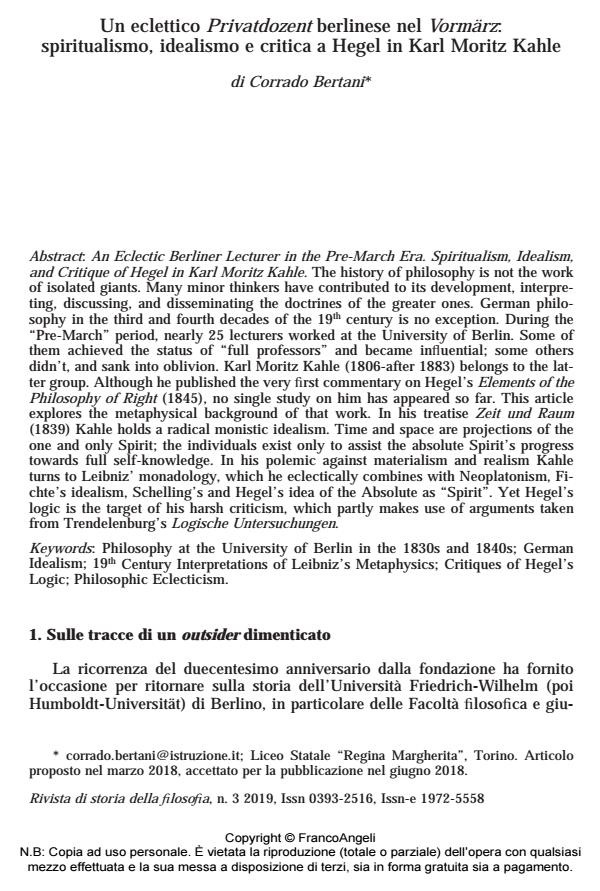Un eclettico Privatdozent berlinese nel Vormärz: spiritualismo, idealismo e critica a Hegel in Karl Moritz Kahle
Titolo Rivista RIVISTA DI STORIA DELLA FILOSOFIA
Autori/Curatori Corrado Bertani
Anno di pubblicazione 2019 Fascicolo 2019/3
Lingua Italiano Numero pagine 33 P. 473-505 Dimensione file 135 KB
DOI 10.3280/SF2019-003004
Il DOI è il codice a barre della proprietà intellettuale: per saperne di più
clicca qui
Qui sotto puoi vedere in anteprima la prima pagina di questo articolo.
Se questo articolo ti interessa, lo puoi acquistare (e scaricare in formato pdf) seguendo le facili indicazioni per acquistare il download credit. Acquista Download Credits per scaricare questo Articolo in formato PDF

FrancoAngeli è membro della Publishers International Linking Association, Inc (PILA), associazione indipendente e non profit per facilitare (attraverso i servizi tecnologici implementati da CrossRef.org) l’accesso degli studiosi ai contenuti digitali nelle pubblicazioni professionali e scientifiche.
An Eclectic Berliner Lecturer in the Pre-March Era. Spiritualism, Idealism, and Critique of Hegel in Karl Moritz Kahle. The history of philosophy is not the work of isolated giants. Many minor thinkers have contributed to its development, interpreting, discussing, and disseminating the doctrines of the greater ones. German philosophy in the third and fourth decades of the 19th century is no exception. During the "Pre-March" period, nearly 25 lecturers worked at the University of Berlin. Some of them achieved the status of "full professors" and became influential; some others didn’t, and sank into oblivion. Karl Moritz Kahle (1806-after 1883) belongs to the latter group. Although he published the very first commentary on Hegel’s Elements of the Philosophy of Right (1845), no single study on him has appeared so far. This article explores the metaphysical background of that work. In his treatise Zeit und Raum (1839) Kahle holds a radical monistic idealism. Time and space are projections of the one and only Spirit; the individuals exist only to assist the absolute Spirit’s progress towards full self-knowledge. In his polemic against materialism and realism Kahle turns to Leibniz’ monadology, which he eclectically combines with Neoplatonism, Fichte’s idealism, Schelling’s and Hegel’s idea of the Absolute as "Spirit". Yet Hegel’s logic is the target of his harsh criticism, which partly makes use of arguments taken from Trendelenburg’s Logische Untersuchungen.
Parole chiave:Philosophy at the University of Berlin in the 1830s and 1840s; German Idealism; 19th Century Interpretations of Leibniz’s Metaphysics; Critiques of Hegel’s Logic; Philosophic Eclecticism.
Corrado Bertani, Un eclettico Privatdozent berlinese nel Vormärz: spiritualismo, idealismo e critica a Hegel in Karl Moritz Kahle in "RIVISTA DI STORIA DELLA FILOSOFIA" 3/2019, pp 473-505, DOI: 10.3280/SF2019-003004